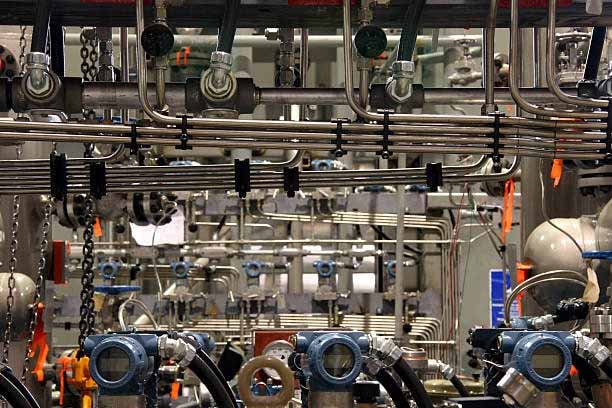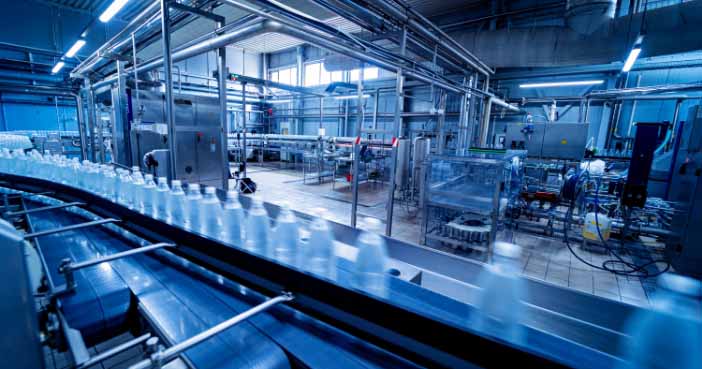Industrial Instrumentation
Industrial Instrumentation for Reliable Performance
Industrial instrumentation is vital for any modern operation that seeks consistency, accuracy, and safety in its processes. From temperature monitoring and pressure control to automated flow measurement, industrial instruments create a foundation of precise data that guides better decision-making and guarantees consistent product quality. When processes remain stable, businesses experience fewer disruptions, reduced cost overruns, and boosted levels of productivity.
Echo Automation provides industrial instrumentation services and integrated solutions that support a wide range of manufacturing, processing, and production environments. The focus is on ensuring each system achieves seamless performance and brings confidence to operators, supervisors, and stakeholders. By combining extensive industry knowledge with cutting-edge technologies, Echo Automation empowers its clients to stay ahead of the competition through more efficient, reliable, and cost-effective operations.
We’ll handle all your Electrical and Automation needs.


What Is Industrial Instrumentation?
Industrial instrumentation involves specialised devices and systems that collect and relay data about vital process parameters. Common measurements include temperature, pressure, flow, level, and humidity. Some operations might also monitor variables such as vibration, chemical composition, or electrical conductivity. In essence, industrial instruments allow facility managers to maintain a continuous overview of operational conditions and ensure everything remains within safe, pre-defined limits.
This field covers much more than the equipment alone. It includes the methods of selection, implementation, calibration, maintenance, and data interpretation. A robust instrumentation framework helps businesses remain agile in adjusting to operational demands, addressing any anomalies swiftly, and protecting both staff and end users from potential hazards.
Precision as the Cornerstone of Manufacturing
Manufacturing facilities depend on uninterrupted processes that deliver accurate, measurable results. One minor miscalculation can lead to production delays, compromised goods, and sometimes even safety incidents. Investing in well-designed and properly maintained industrial instrumentation offers multiple benefits. These range from immediate improvements in throughput to long-term gains in overall site safety and reliability.
Echo Automation addresses the critical importance of precision through advanced device selection and integrated system design. All chosen instruments comply with relevant industry standards and are matched to each unique production environment. Correct calibration and periodic maintenance further uphold this standard, giving operators confidence in their day-to-day tasks.
Eliminating Errors and Product Loss
An accurate reading of production parameters helps facilities create consistent, high-quality output. If deviations begin to develop, instrumentation systems detect them early and signal operators to adjust conditions. In industries that handle perishable or sensitive goods, precise readings mean the difference between safe products and compromised items.
Maintaining Compliance and Standards
Many sectors must comply with regulations that protect consumers, workers, and the environment. Effective instrumentation is often a prerequisite for meeting these requirements. For instance, a facility producing pharmaceuticals may need to prove that certain temperature or humidity levels remain consistent throughout production. High-quality instruments, combined with precise tracking, make regulatory checks smoother.
Key Benefits of Effective Industrial Instrumentation Services
Well-implemented instrumentation services offer substantial advantages to any organisation. These benefits add value through improved production monitoring, reduced waste, and stronger operational insight.
Streamlined Process Control
Automation is a prominent feature of modern industry, and it depends on accurate data. Industrial instruments feed real-time values into automated control systems, prompting immediate adjustments that keep production within set targets. This streamlining of control activities reduces the need for manual oversight, minimises human error, and increases overall efficiency.
Optimised Quality Assurance
Continuous, data-driven monitoring forms the backbone of a successful quality control programme. Instruments measuring temperature, pressure, or flow provide instant updates on whether processes stay within required tolerances. When anomalies appear, operators can spot them quickly and intervene. This safeguarding of quality not only preserves an organisation’s reputation but also avoids costly rework or product recalls.
Enhanced Safety
Safety remains a top priority in any industrial environment. Monitoring hazardous parameters such as gas pressure, chemical levels, or airborne particulates can mitigate serious risks. Real-time instrumentation data alerts personnel to any dangerous changes, prompting immediate action to secure the site. A comprehensive instrumentation system promotes safe working conditions and minimises the possibility of injuries.
Predictive Maintenance and Reduced Downtime
Ensuring that machinery runs smoothly can be challenging for industrial facilities. When instruments track a range of operational parameters, technicians gain a detailed understanding of how equipment performs over time. This data allows them to schedule maintenance before serious failures occur, cutting back on unplanned downtime and improving the reliability of the equipment. Reduced downtime lowers overall operating costs, so instrumentation services become an asset in long-range cost management.
Lower Operating Costs
Precise measurement and control help sites prevent overuse of resources, such as energy or raw materials. Accurate data reduces waste and supports cost-saving initiatives. Many organisations recoup their instrumentation investments quickly by making incremental improvements in efficiency or reducing lost product due to poor batch conditions.
Common Industrial Instruments and Their Roles
Each facility is unique, but there are several categories of industrial instruments that often feature across different sectors. Selecting and calibrating these devices correctly is the key to dependable performance.
These instruments measure thermal conditions throughout processes. Food and pharmaceutical industries rely heavily on accurate temperature sensors to maintain product integrity. Metals or chemical plants also need precise thermal readings to avert dangerous equipment failures or suboptimal batch conditions.
Pressure transducers gauge gases and liquids, sending signals to operators or automation systems regarding real-time pressure. They are found in water treatment, oil and gas, automotive manufacturing, and many other fields that rely on controlled pressurised systems.
Flow meters track the volume or mass of a liquid or gas passing through a pipeline or machine. Flow monitoring can help avoid waste, ensure consistent mixing of ingredients, and maintain safe fluid levels for industrial processes.
Level sensors provide data on how much material remains in tanks or silos, ideal for tasks ranging from beverage bottling to chemical containment. Keeping these levels within safe boundaries is essential to efficient operations.
Some facilities use vibration sensors, ultrasonic detectors, or optical scanners, which capture specialised data for critical applications. These advanced tools extend the reach of industrial instrumentation into highly specific tasks and extremely challenging environments.
Steps to Ensure Reliable Industrial Instruments
A fully integrated and reliable system needs more than high-end hardware. It requires accurate planning, dedicated upkeep, and knowledgeable intervention when required. Echo Automation takes a holistic approach to each project, viewing instrumentation as part of a broader operational framework.
The journey begins with understanding the facility’s needs. Identifying the essential parameters and operating conditions guides the choice of instruments. Selecting the right sensors and transducers that handle the environment’s temperature, pressure, or chemical factors is vital.
Correct instrument placement avoids data inaccuracies caused by environmental factors such as vibration or extreme temperatures. Calibration, both at commissioning and at planned intervals, ensures that measurements align with acceptable tolerances. Without this level of care, readings can drift and mislead operators.
Industrial environments can be harsh, with dust, heavy machinery, and continuous wear. Scheduling maintenance at intervals based on data trends and manufacturer guidelines helps keep instruments fully functional. Early detection of sensor faults saves time and money in the long term.
Coupling instruments with control software maximises the usefulness of real-time information. Automated responses can be programmed to adjust temperature controls or open or close valves, improving consistency and reducing manual intervention.
Operators and technicians must be prepared to manage or troubleshoot the system effectively. Echo Automation offers guidance and instruction for facility personnel, so they can interact confidently with new instruments and resolve minor issues without delay.
Industrial Instrumentation Services by Echo Automation
Echo Automation’s industrial instrumentation services cover all aspects of design, implementation, and ongoing support. Our experts provide a consultative approach, from the first conversation about your production challenges to the final tuning of your instruments. By combining technical insight and industry experience, we create solutions that improve processes, cut downtime, and offer clear, actionable data.
Tailored Engineering Solutions
Each industrial site has distinct conditions and workflows. Echo Automation accounts for these variables in every design, selecting instruments that can handle abrasive substances, corrosive chemicals, or extreme temperatures. The final outcome is a solution built for lasting performance.
Safety and Compliance
Staying within regulatory guidelines is a significant concern for many facilities. Industrial instrumentation services from Echo Automation ensure that monitoring and control systems meet the appropriate safety standards. The inclusion of failsafe measures, alerts, and control backups reduces any potential danger.
Ongoing Support and Training
Beyond implementing and commissioning instrumentation, Echo Automation remains ready to assist clients with follow-up services. Regular maintenance, calibration, and system enhancements are part of a broader commitment to long-term reliability. The team also offers training sessions for operators, providing clarity on instrument features and routine checks.
Contact Echo Automation for Advanced Industrial Instruments
Every industrial operation thrives on precision, from large-scale manufacturing to more specialised production lines. Echo Automation’s expertise ensures your facility benefits from dependable, high-accuracy instrumentation that underpins safe processes, boosts efficiency, and reduces the risk of costly disruptions.
Elevate your site’s performance by tapping into our industrial instrumentation services. Our engineers work closely with you, aiming to achieve the highest levels of accuracy, consistency, and compliance. For more information on how our advanced solutions can improve your operations, contact Echo Automation today.
